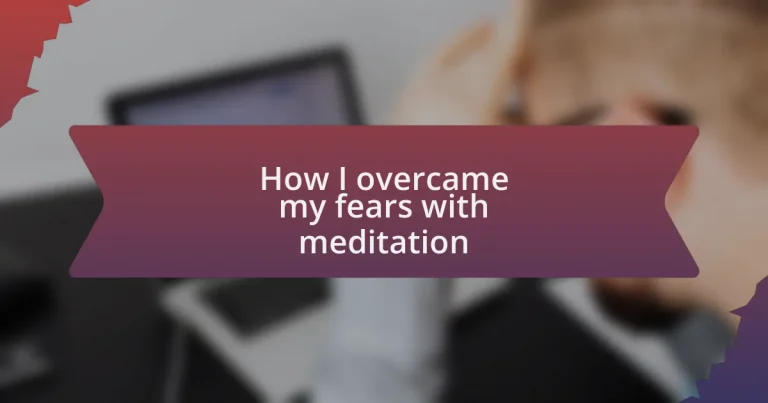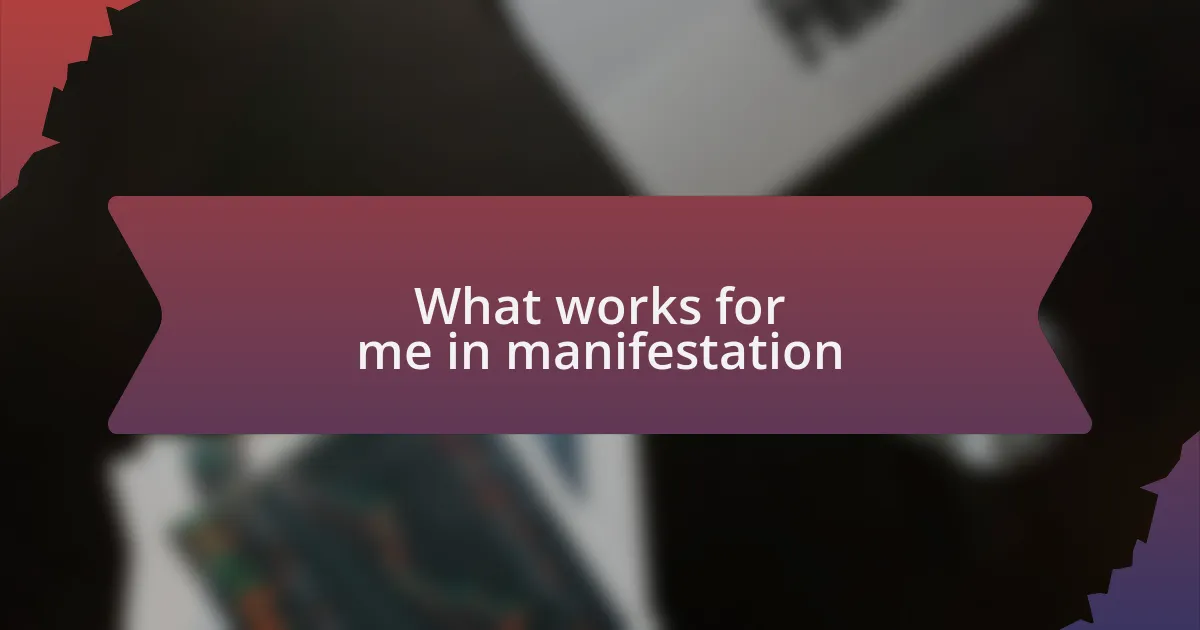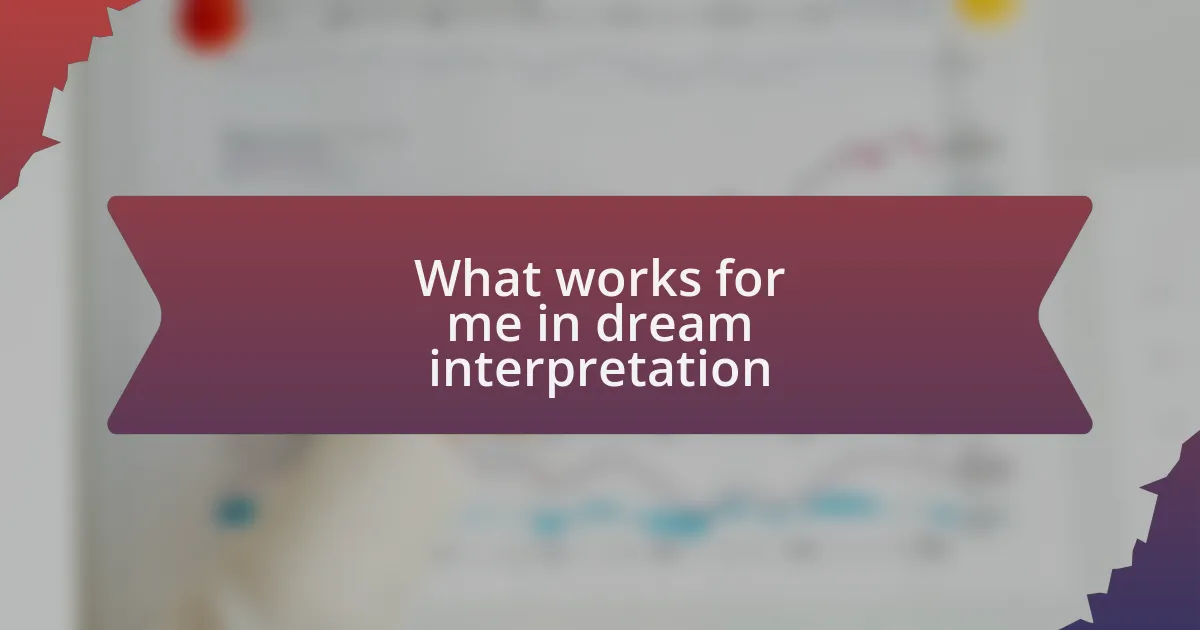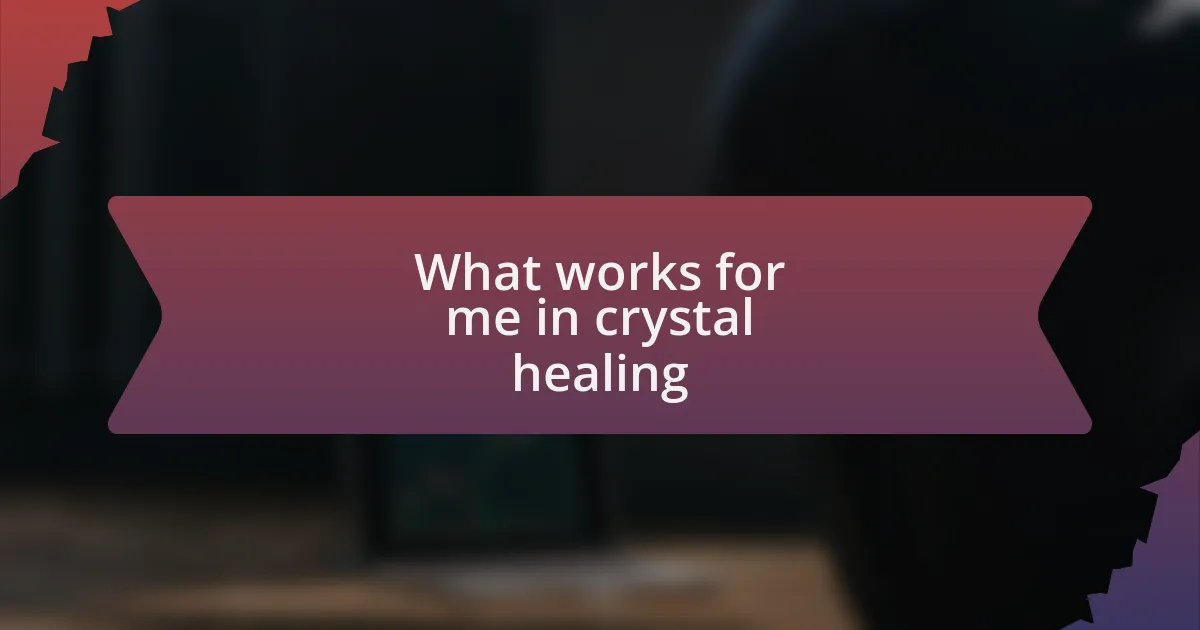Key takeaways:
- Evelyn Hartman emphasizes the transformative power of meditation in facing and understanding personal fears.
- Meditation techniques such as deep breathing, guided sessions, and mindfulness can cultivate emotional resilience and inner peace.
- The practice of acknowledging fears, rather than avoiding them, enables personal growth and fosters a greater sense of presence in everyday life.
- Sharing experiences through podcasts can enhance the meditation journey by offering support and inspiration through relatable narratives.
Author: Evelyn Hartman
Bio: Evelyn Hartman is a contemporary author known for her evocative storytelling and rich character development. With a background in psychology, she weaves intricate narratives that explore the complexities of human relationships and personal growth. Her debut novel, “Whispers in the Wind,” garnered critical acclaim and established her as a powerful voice in modern literature. Evelyn resides in the Pacific Northwest, where she draws inspiration from the vibrant landscapes and diverse communities around her. When she’s not writing, she enjoys hiking, gardening, and spending time with her two rescue dogs.
Understanding meditation techniques
Meditation techniques can vary greatly, but they often share a core purpose: to cultivate mindfulness and awareness. I remember when I first tried deep breathing as a technique; it felt a bit silly at first, but focusing solely on my breath quickly transformed my anxious thoughts into a soothing rhythm. Have you ever found peace simply by concentrating on something as fundamental as your own breath?
One popular method is guided meditation, where an instructor or recording leads you through visualizations and relaxation exercises. I vividly recall the first time I listened to a guided session that took me on a journey to a tranquil forest. The softness of the narrator’s voice combined with my imagination made me feel completely at ease, as if I were physically there, leaving all my fears behind. Doesn’t it feel great to escape to such a serene place, even if just for a little while?
Another technique is mindfulness meditation, where you observe your thoughts without judgment. In my own practice, I’ve discovered that acknowledging my fears rather than suppressing them can be incredibly liberating. Instead of avoiding that creeping feeling of dread, I simply let it be. Have you considered how observing your thoughts might change your perception of fear? Embracing this technique has not only helped me understand my fears, but it has also allowed me to live more fully in the present moment.
Benefits of meditation for fears
Fears can often feel overwhelming, but meditation provides a powerful tool to navigate them. I recall a moment when I faced a particularly intense fear of public speaking. Through regular meditation, I learned to visualize myself speaking confidently, which not only calmed my nerves but also transformed my entire approach to those situations. Have you ever felt that shift in your mindset just by picturing a more positive outcome?
Practicing meditation can also increase emotional resilience. When I took up meditation, I hadn’t realized how much my fears were rooted in anxiety about things beyond my control. By focusing on my breath and grounding myself, I developed a new perspective. This practice allowed me to view my fears as temporary feelings rather than insurmountable barriers. Isn’t it liberating to recognize that we can control our response to fear?
Moreover, meditation fosters a greater sense of inner peace. I often reflect on how those quiet moments of introspection helped me to confront my fears instead of running away from them. It’s like having a conversation with myself, where I acknowledge my worries, but also remind myself of my strengths. Have you considered how dedicating a few minutes each day to this practice could help you lessen the grip of your own fears?
Exploring common fears in life
Common fears can manifest in many forms, impacting how we go about our daily lives. For instance, the fear of rejection often looms large for many, affecting relationships and opportunities. I remember feeling paralyzed at the thought of exposing my creative work to others, fearing their judgment. Have you ever felt a similar hesitation, wondering how your ideas might be received?
Another prevalent fear is the fear of the unknown. I once faced this when contemplating a major life change, like relocating for a job. It was daunting to think about starting over in an unfamiliar place. I asked myself, what if it turns out better than I can imagine? Sometimes, I think embracing uncertainty can open doors to unexpected opportunities.
Also, there’s the fear of failure, which can often hold us back from pursuing our dreams. I vividly recall wanting to pursue my passion for writing but being consumed by the anxiety of not succeeding. Yet, through reflection and mindfulness, I learned to reframe that fear. Isn’t it interesting how shifting our perspective can turn failure into a stepping stone for growth?
My personal journey with fears
Fear has always been a part of my life, creeping in like an unwelcome shadow. I can still remember the moment I realized I was afraid of being truly seen. Sharing my thoughts felt like standing on a precipice, vulnerable and exposed. Have you ever felt that tight knot in your stomach when faced with expressing your true self?
During my journey, I discovered that some fears were rooted deeply in childhood experiences, echoing insecurities that followed me into adulthood. I sometimes found myself hesitating at opportunities that could enhance my life, worrying about past failures. It was as if those old tapes played on repeat, clouding my judgment and keeping me from moving forward. Isn’t it incredible how past experiences can influence the present?
But through meditation, I started to unravel these fears, one breath at a time. I can still feel the warmth of those quiet moments when I embraced my anxieties instead of running from them. This practice allowed me to confront my fears with compassion, turning self-doubt into understanding. What if facing our fears head-on could lead to unprecedented growth and self-discovery?
How meditation helped me
There were times when I sat on my meditation cushion, feeling the weight of my fears pressing down like a heavy blanket. One particular session stands out vividly; I closed my eyes, inhaled deeply, and suddenly, the memories of past rejections flooded my mind. Instead of feeling overwhelmed, I allowed those thoughts to drift away—like leaves floating down a stream. Isn’t it liberating to know we can let go of what weighs us down?
What I found surprising was how meditation shifted my perspective. It transformed those moments of panic into opportunities for reflection and learning. I remember a day when I encountered an old fear about public speaking. Rather than succumbing to anxiety, I quietly focused on my breath, which grounded me and gave me the confidence to express my thoughts openly. Have you realized how something as simple as breath can empower us in a profound way?
As I cultivated this practice, I noticed the small shifts in my daily life. Conversations became easier; I no longer recoiled at the thought of sharing my opinions. The more I meditated, the more I felt a sense of calm rise within me, like a soothing balm for my restless mind. This journey wasn’t just about overcoming my fears; it became about embracing the uncertainties of life with open arms. What has meditation taught you about facing your own fears?
Practical tips for meditative practices
Finding a comfortable spot is essential for effective meditation. I often scout out a quiet space, away from distractions, where I can sit or lie down without interruptions. This has made all the difference—creating an inviting atmosphere encourages me to relax fully. Isn’t it fascinating how the environment can influence our mindset?
Another tip that I’ve found helpful is to start small. Initially, I aimed for just five minutes each day. Gradually, I increased that time as my comfort with the practice grew. This approach relieved the pressure of lengthy sessions, making meditation feel less daunting. Have you ever noticed how small steps can lead to significant changes over time?
Incorporating guided meditations can also enhance the experience. I remember listening to a fantastic app that walked me through visualization techniques, allowing me to picture my fears dissolving into the air. This not only made the process engaging, but it also fostered a deeper connection to my emotional landscape. Have you tried using guidance in your practice? If not, it might just unlock new dimensions of your meditative journey.
Sharing experiences through podcasts
Sharing experiences through podcasts brings a unique richness to the discourse on meditation. I recall the first time I stumbled upon a podcast episode where someone vulnerably shared their journey through fear and anxiety. Hearing their story resonated with me deeply; it was as if they were voicing my own struggles. Isn’t it empowering to know we’re not alone in our experiences?
Listening to others’ narratives can catalyze personal reflection and encourage growth. I often find myself pausing the podcast to ponder how their insights could apply to my life. One episode I listened to featured a guest who explained how meditation transformed their fear of public speaking. That story inspired me to confront my own public speaking anxieties; it’s astonishing what a shared story can do for one’s courage.
Moreover, podcasts offer a platform for nuanced exploration of topics often shied away from in ordinary conversations. I remember being part of a live podcast gathering where listeners shared their fears about the paranormal while integrating their meditative practices. The combination of real fears and the promise of empowerment through meditation created an electrifying atmosphere. Isn’t that connection between fears and support what we all crave?





